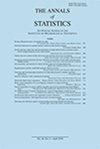On lower bounds for the bias-variance trade-off
IF 3.2
1区 数学
Q1 STATISTICS & PROBABILITY
引用次数: 5
Abstract
It is a common phenomenon that for high-dimensional and nonparametric statistical models, rate-optimal estimators balance squared bias and variance. Although this balancing is widely observed, little is known whether methods exist that could avoid the trade-off between bias and variance. We propose a general strategy to obtain lower bounds on the variance of any estimator with bias smaller than a prespecified bound. This shows to which extent the bias-variance trade-off is unavoidable and allows to quantify the loss of performance for methods that do not obey it. The approach is based on a number of abstract lower bounds for the variance involving the change of expectation with respect to different probability measures as well as information measures such as the Kullback-Leibler or chi-square divergence. Some of these inequalities rely on a new concept of information matrices. In a second part of the article, the abstract lower bounds are applied to several statistical models including the Gaussian white noise model, a boundary estimation problem, the Gaussian sequence model and the high-dimensional linear regression model. For these specific statistical applications, different types of bias-variance trade-offs occur that vary considerably in their strength. For the trade-off between integrated squared bias and integrated variance in the Gaussian white noise model, we propose to combine the general strategy for lower bounds with a reduction technique. This allows us to reduce the original problem to a lower bound on the bias-variance trade-off for estimators with additional symmetry properties in a simpler statistical model. To highlight possible extensions of the proposed framework, we moreover briefly discuss the trade-off between bias and mean absolute deviation.偏差-方差权衡的下界
对于高维和非参数统计模型,比率最优估计器平衡偏差平方和方差是一种常见现象。虽然这种平衡被广泛观察到,但很少有人知道是否存在可以避免偏差和方差之间权衡的方法。我们提出了一种一般策略来获得偏差小于预定界的任何估计量的方差下界。这表明偏差-方差权衡在多大程度上是不可避免的,并允许量化不服从它的方法的性能损失。该方法基于方差的一些抽象下界,这些下界涉及相对于不同概率度量和信息度量(如Kullback-Leibler或卡方散度)的期望变化。其中一些不等式依赖于信息矩阵的新概念。在文章的第二部分,将抽象下界应用于几种统计模型,包括高斯白噪声模型、边界估计问题、高斯序列模型和高维线性回归模型。对于这些特定的统计应用,会出现不同类型的偏差-方差权衡,其强度差异很大。对于高斯白噪声模型中积分平方偏差和积分方差之间的权衡,我们提出将下界的一般策略与约简技术相结合。这允许我们将原始问题简化为在更简单的统计模型中具有附加对称性的估计量的偏差-方差权衡的下界。为了突出提出的框架的可能扩展,我们还简要讨论了偏差和平均绝对偏差之间的权衡。
本文章由计算机程序翻译,如有差异,请以英文原文为准。
求助全文
约1分钟内获得全文
求助全文
来源期刊

Annals of Statistics
数学-统计学与概率论
CiteScore
9.30
自引率
8.90%
发文量
119
审稿时长
6-12 weeks
期刊介绍:
The Annals of Statistics aim to publish research papers of highest quality reflecting the many facets of contemporary statistics. Primary emphasis is placed on importance and originality, not on formalism. The journal aims to cover all areas of statistics, especially mathematical statistics and applied & interdisciplinary statistics. Of course many of the best papers will touch on more than one of these general areas, because the discipline of statistics has deep roots in mathematics, and in substantive scientific fields.
 求助内容:
求助内容: 应助结果提醒方式:
应助结果提醒方式:


